We may not have the course you’re looking for. If you enquire or give us a call on 01344203999 and speak to our training experts, we may still be able to help with your training requirements.
We ensure quality, budget-alignment, and timely delivery by our expert instructors.
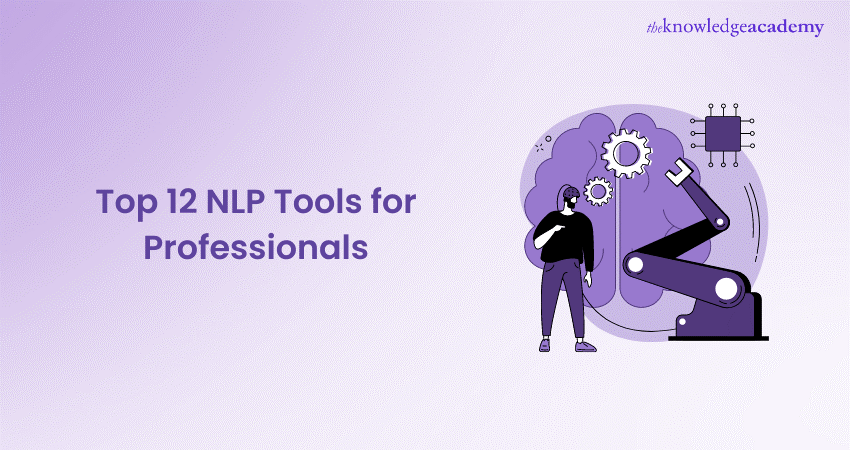
Natural Language Processing (NLP) is a branch of Artificial Intelligence (AI) that deals with how computers understand and use written and spoken human languages. NLP Tools are software programs that use NLP methods to offer different features and services to users. In this blog, we will explore 12 of the best NLP Tools in the market and explain what they do, why they are useful, and how they can be used.
Table of Content
1) List of best NLP Tools
a) SpaCy
b) IBM Watson
c) Google Cloud
d) GenSim
e) MonkeyLearn
f) Aylien
g) Amazon Comprehend
h) NLTK
i) Stanford Core NLP
j) TextBlob
2) Conclusion
List of best NLP Tools
Here is the list of best NLP Tools with their features and use cases:
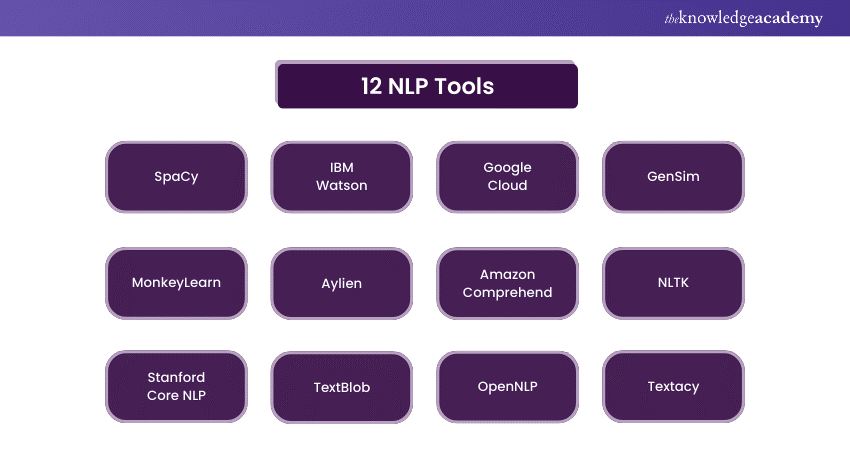
SpaCy
SpaCy is a Python-based open-source library designed for advanced Natural Language Processing. It offers a fast and accurate way to perform common NLP tasks, such as tokenisation, part-of-speech tagging, named entity recognition, dependency parsing, lemmatisation, and more.
SpaCy also supports deep learning models for text classification, sentiment analysis, entity linking, and word embeddings. SpaCy is designed for production and can easily handle extensive, complex text data.
Some of the features and benefits of SpaCy are:
a) It is fast and efficient and can process millions of words per second.
b) It is easy to use, customise, and has a clear and consistent API.
c) It boasts multilingual support for numerous languages, encompassing English, French, German, Spanish, Portuguese, Italian, Dutch, and beyond.
d) It boasts a robust ecosystem filled with extensions and integrations, including spaCy-Transformers, spaCy-AllenNLP, spaCy-stanza, and others.
e) It has a vibrant community of developers and users and offers extensive documentation and tutorials.
Some of the use cases of SpaCy are:
a) Building chatbots and conversational agents
b) Extracting information from resumes and job descriptions
c) Analysing customer feedback and reviews
d) Generating natural language summaries and captions
e) Developing natural language interfaces and applications
IBM Watson
IBM Watson is a cloud-native platform offering a range of AI and Natural Language Processing services designed to cater to diverse industries and domains. It enables users to easily build, deploy, and scale AI-powered applications and solutions. Some of the features and benefits of IBM Watson are:
a) It is scalable, reliable, and can handle large, complex data sets and workloads.
b) It offers flexibility and customisation options, empowering users to adapt the services according to their unique requirements and preferences.
c) It prioritises security and compliance, upholding the most rigorous data privacy and protection standards.
d) It is accessible, affordable, and offers various pricing plans and options for different users and use cases.
e) It is innovative and cutting-edge and leverages the latest AI and NLP research and technology advancements.
Some of the use cases of IBM Watson are:
a) Enhancing customer service and experience
b) Improving business intelligence and decision-making
c) Automating content creation and curation
d) Optimising marketing and sales strategies
e) Enabling cross-cultural and multilingual communication
Google Cloud
Google Cloud is a versatile cloud computing platform that provides various services and products catering to diverse domains and industries. It enables users to build, run, and scale applications and solutions on Google's infrastructure and network. Here are some features and benefits of Google Cloud:
a) It is fast and powerful and can process large and complex data sets and workloads with ease
b) It is easy to use and integrate and has a simple and intuitive interface and API
c) It is scalable and reliable and can handle high volumes of traffic and requests
d) It is secure and compliant and follows the best practices of data privacy and protection
e) It is cost-effective and efficient and offers various pricing plans and options for different users and use cases
Some of the use cases of Google Cloud are:
a) Building chatbots and conversational agents
b) Analysing customer feedback and reviews
c) Translating and localising content across languages
d) Generating natural language summaries and captions
e) Developing natural language interfaces and applications
GenSim
Gensim represents an open-source Python library dedicated to unsupervised topic modelling and Natural Language Processing. It offers a fast and scalable way to perform common NLP tasks, such as text preprocessing, word embeddings, topic modelling, document similarity, and more.
Further, GenSim also supports deep learning models for text generation, summarisation, and translation. GenSim is designed for academic and industrial use and can easily handle large and complex text data. Some of the features and benefits of GenSim are:
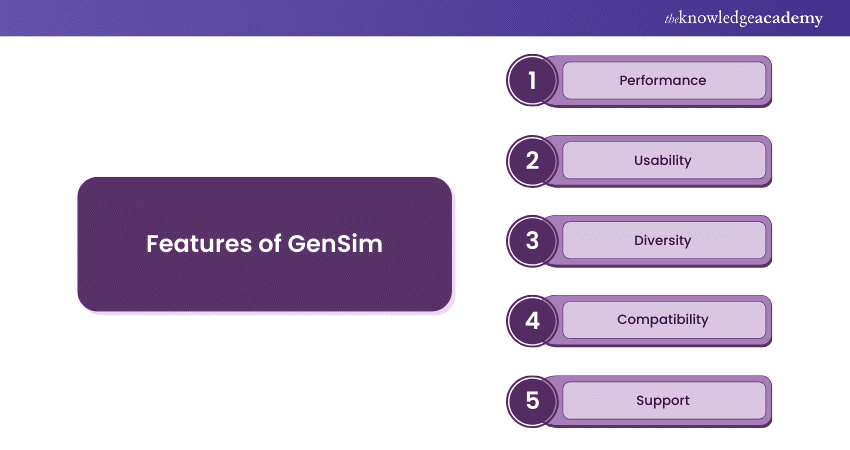
a) It is fast and efficient and can process millions of words per second.
b) It is easy to use and customise and has a clear and consistent API.
c) Providing multilingual assistance for various languages, it covers English, French, German, Spanish, Portuguese, Italian, Dutch, and others.
d) It has a robust ecosystem of extensions and integrations, such as gensim-data, gensim-summarisation, gensim-server, and more.
e) It has a vibrant community and offers extensive documentation and tutorials.
Some of the use cases of GenSim are:
a) Discovering topics and themes from large collections of text data
b) Measuring the similarity and distance between documents and texts
c) Generating natural language summaries and abstracts
d) Translating and paraphrasing text data across languages
e) Developing natural language interfaces and applications
MonkeyLearn
MonkeyLearn is a cloud-based platform that provides a suite of AI and NLP services for various domains and industries. It enables users to build, deploy, and scale AI-powered applications and solutions with ease. Some of the features and benefits of MonkeyLearn are:
a) It is user-friendly and intuitive and allows users to create and train custom models with a few clicks and without any coding.
b) Moreover, it is scalable and reliable and can handle large and complex data sets and workloads.
c) It is flexible and customisable and allows users to integrate the services with various platforms and tools, such as Zapier, Google Sheets, Zendesk, Slack, and more.
d) Besides, it is secure and compliant and follows the best practices of data privacy and protection.
e) It is affordable and efficient and offers various pricing plans and options for different users and use cases.
Some of the use cases of MonkeyLearn are:
a) Analysing customer feedback and reviews
b) Extracting information from invoices and receipts
c) Generating catchy headlines and captions
d) Creating engaging data visualisations
e) Developing natural language interfaces and applications
Dive into the fascinating realm of AI with our Introduction to AI Course – Sign up today!
Aylien
Aylien is a cloud-based platform that provides a suite of AI and NLP services for various domains and industries. It enables users to build, deploy, and scale AI-powered applications and solutions with ease. Some of the features and benefits of Aylien are:
a) It is fast and powerful and can process large and complex data sets and workloads with ease.
b) It is easy to use and integrate and has a simple and intuitive interface and API.
c) It is scalable and reliable and can handle high volumes of traffic and requests.
d) It is secure and compliant and follows the best practices of data privacy and protection.
e) It is innovative and cutting-edge and leverages the latest advancements in AI and NLP research and technology.
Some of the use cases of Aylien are:
a) Analysing customer feedback and reviews
b) Extracting information from news articles and web pages
c) Generating natural language summaries and headlines
d) Translating and localising content across languages
e) Developing natural language interfaces and applications
Amazon Comprehend
Amazon Comprehend is a cloud-based service that provides a suite of AI and NLP services for various domains and industries. It enables users to build, deploy, and scale AI-powered applications and solutions with ease. Some of the features and benefits of Amazon Comprehend are:
a) It is fast and powerful and can process large and complex data sets and workloads with ease.
b) It is easy to use and integrate and has a simple and intuitive interface and API.
c) It is scalable and reliable and can handle high volumes of traffic and requests.
d) It is secure and compliant and follows the best practices of data privacy and protection.
e) It is cost-effective and efficient and offers various pricing plans and options for different users and use cases.
Some of the use cases of Amazon Comprehend are:
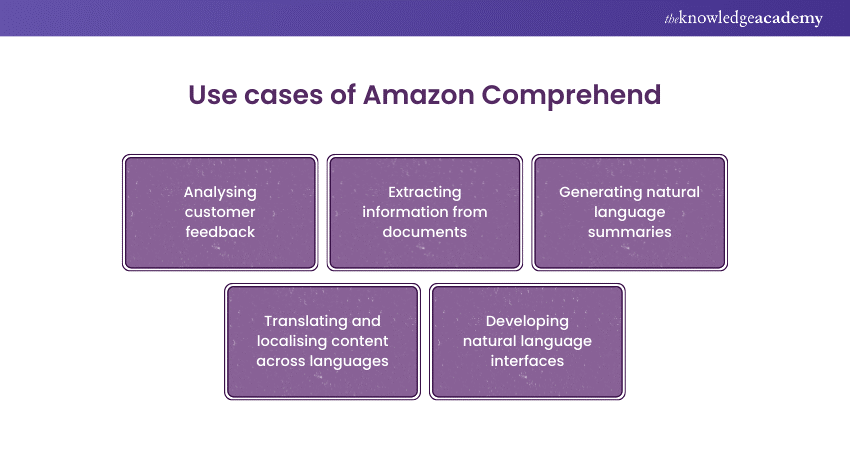
a) Analysing customer feedback and reviews
b) Extracting information from documents and forms
c) Generating natural language summaries and headlines
d) Translating and localising content across languages
e) Developing natural language interfaces and applications
NLTK
NLTK is an open-source Python library crafted for Natural Language Processing. It offers a comprehensive and easy-to-use way to perform common NLP tasks, such as tokenisation, part-of-speech tagging, named entity recognition, stemming, lemmatisation, parsing, chunking, and more.
NLTK also supports various corpora and resources, such as WordNet, Brown Corpus, Movie Reviews Corpus, and more. NLTK is designed for teaching and research purposes and can handle small and medium-sized text data with ease. Some of the features and benefits of NLTK are:
a) It is comprehensive and versatile and covers a wide range of NLP topics and techniques.
b) It is easy to use and learn and has a clear and consistent API.
c) With multilingual capabilities spanning English, French, German, Spanish, Portuguese, Italian, Dutch, and beyond, it ensures accessibility for diverse users.
d) It has a robust ecosystem of extensions and integrations, such as nltk-trainer, nltk-contrib, nltk-data, and more.
e) With a lively community of developers and users, it provides comprehensive documentation and tutorials for users' convenience.
Some of the use cases of NLTK are:
a) Teaching and learning NLP concepts and methods
b) Exploring and experimenting with NLP data and models
c) Building prototypes and proof-of-concepts for NLP applications and solutions
d) Developing natural language interfaces and applications
Stanford Core NLP
Stanford Core NLP is an open-source library for Natural Language Processing in Java. It offers a robust and accurate way to perform common NLP tasks, such as tokenisation, part-of-speech tagging, named entity recognition, dependency parsing, coreference resolution, and more.
Stanford Core NLP also supports deep learning models for text classification, relation extraction, and machine translation. Stanford Core NLP is designed for production use and can handle large and complex text data with ease. Some of the features and benefits of Stanford Core NLP are:
a) It is robust and accurate and can process large and complex data sets and workloads with ease.
b) It is easy to use and customise and has a clear and consistent API.
c) It supports multiple languages, including English, Arabic, Chinese, French, German, Spanish, and more.
d) It has a robust ecosystem of extensions and integrations, such as StanfordNLP, CoreNLP Server, CoreNLP Python, and more.
e) Boasting a thriving community of developers and users, it provides extensive documentation and tutorials.
Some of the use cases of Stanford Core NLP are:
a) Building chatbots and conversational agents
b) Extracting information from news articles and web pages
c) Analysing customer feedback and reviews
d) Generating natural language summaries and captions
e) Developing natural language interfaces and applications
Enhance your expertise in Machine Learning through our Machine Learning Course – Sign up now!
TextBlob
TextBlob is an open-source library for Natural Language Processing in Python. It offers a simple and elegant way to perform common NLP tasks, such as tokenisation, part-of-speech tagging, noun phrase extraction, sentiment analysis, spelling correction, translation, and more.
TextBlob also supports various corpora and resources, such as WordNet, Brown Corpus, Movie Reviews Corpus, and more. TextBlob is designed for beginners and hobbyists and can handle small and medium-sized text data with ease. Some of the features and benefits of TextBlob are:
a) It is simple and elegant and has a user-friendly and intuitive interface and API.
b) It is easy to use and learn and has a clear and consistent API.
c) Featuring multilingual support across multiple languages such as English, French, German, Spanish, Portuguese, Italian, Dutch, and beyond, it caters to global audiences.
d) It has a robust ecosystem of extensions and integrations, such as textblob-fr, textblob-de, textblob-aptagger, and more.
e) It features in-depth documentation and tutorials supported by a dynamic community of developers and users.
Some of the use cases of TextBlob are:
a) Teaching and learning NLP concepts and methods
b) Exploring and experimenting with NLP data and models
c) Building prototypes and proof-of-concepts for NLP applications and solutions
d) Developing natural language interfaces and applications
OpenNLP
OpenNLP serves as an open-source Java library designed for Natural Language Processing. It offers a modular and flexible way to perform common NLP tasks, such as tokenisation, part-of-speech tagging, named entity recognition, chunking, parsing, coreference resolution, and more.
OpenNLP also supports various corpora and resources, such as CoNLL, Penn Treebank, OntoNotes, and more. OpenNLP is designed for production use and can handle large and complex text data with ease. Some of the features and benefits of OpenNLP are:
a) It is modular and flexible and allows users to create and customise their own NLP pipelines and components.
b) It is easy to use and integrate and has a clear and consistent API.
c) Offering multilingual assistance in English, French, German, Spanish, Portuguese, Italian, Dutch, and more, it facilitates communication for users worldwide.
d) It has a robust ecosystem of extensions and integrations, such as opennlp-tools, opennlp-uima, opennlp-brat, and more.
e) Backed by a lively community of developers and users, it boasts extensive documentation and tutorials.
Some of the use cases of OpenNLP are:
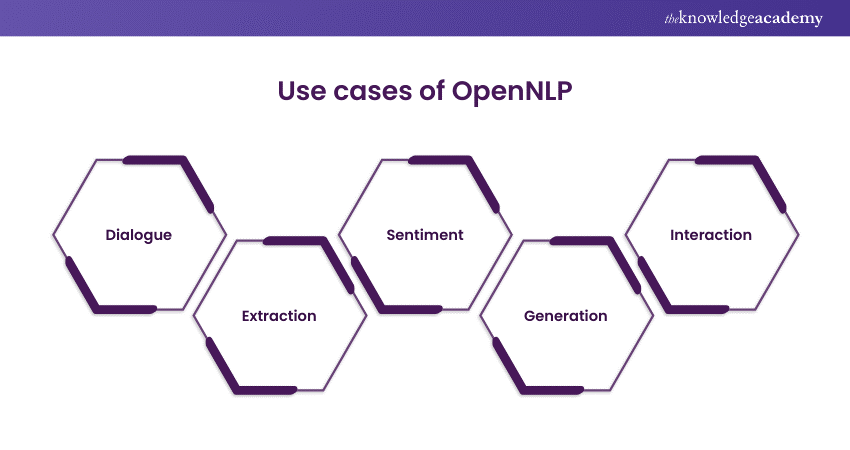
a) Building chatbots and conversational agents
b) Extracting information from documents and forms
c) Analysing customer feedback and reviews
d) Generating natural language summaries and captions
e) Developing natural language interfaces and applications
Textacy
Textacy is an open-source library for Natural Language Processing in Python. It offers a high-level and convenient way to perform common and advanced NLP tasks, such as text preprocessing, text analysis, text extraction, text generation, text summarisation, text visualisation, and more.
Textacy also supports various corpora and resources, such as Wikipedia, Reddit, Common Crawl, and more. Textacy is designed for research and exploration purposes and can handle small and medium-sized text data with ease. Some of the features and benefits of Textacy are:
a) It is high-level and convenient and has a user-friendly and intuitive interface and API.
b) It is easy to use and learn and has a clear and consistent API.
c) With support for numerous languages, including English, French, German, Spanish, Portuguese, Italian, Dutch, and beyond, it ensures inclusivity and accessibility.
d) It has a robust ecosystem of extensions and integrations, such as textacy-data, textacy-spacier, textacy-viz, and more.
e) Fueled by an energetic community of developers and users, it presents comprehensive documentation and tutorials.
Some of the use cases of Textacy are:
a) Teaching and learning NLP concepts and methods
b) Exploring and experimenting with NLP data and models
c) Building prototypes and proof-of-concepts for NLP applications and solutions
d) Developing natural language interfaces and applications
Conclusion
NLP Tools are software applications that leverage Natural Language Processing techniques to provide various functionalities and solutions for users. NLP Tools can help professionals in different fields, such as marketing, journalism, education, healthcare, finance, and more.
Master NLP Fundamentals with our Natural Language Processing (NLP) Fundamentals With Python Course – Sign up now!
Frequently Asked Questions
What is NLP?

NLP stands for Natural Language Processing, which falls within the domain of Artificial Intelligence and focuses on the interplay between computers and human languages. NLP enables computers to understand, analyse, generate, and manipulate natural language data, including text and speech.
Which tools are used for NLP?

There are many tools that are used for NLP, such as libraries, platforms, services, and applications. Some of the popular tools are SpaCy, IBM Watson, Google Cloud, GenSim, MonkeyLearn, Aylien, Amazon Comprehend, NLTK, Stanford Core NLP, TextBlob, OpenNLP, and Textacy. These tools provide various functionalities and solutions for NLP tasks and problems.
What are the other resources and offers provided by The Knowledge Academy?

The Knowledge Academy takes global learning to new heights, offering over 30,000 online courses across 490+ locations in 220 countries. This expansive reach ensures accessibility and convenience for learners worldwide.
Alongside our diverse Online Course Catalogue, encompassing 17 major categories, we go the extra mile by providing a plethora of free educational Online Resources like News updates, Blogs, videos, webinars, and interview questions. Tailoring learning experiences further, professionals can maximise value with customisable Course Bundles of TKA.
What is Knowledge Pass, and how does it work?

The Knowledge Academy’s Knowledge Pass, a prepaid voucher, adds another layer of flexibility, allowing course bookings over a 12-month period. Join us on a journey where education knows no bounds.
What are related NLP courses and blogs provided by The Knowledge Academy?

The Knowledge Academy offers various NLP Training, including NLP Foundation and Practitioner Courses. These courses cater to different skill levels, providing comprehensive insights into “What is NLP?”
Our Business skills blogs cover a range of topics related to Data Science, offering valuable resources, best practices, and industry insights. Whether you are a beginner or looking to advance your Business skills, The Knowledge Academy's diverse courses and informative blogs have you covered.
Upcoming Data, Analytics & AI Resources Batches & Dates
Date
 Data Science Analytics
Data Science Analytics
Fri 21st Feb 2025
Fri 25th Apr 2025
Fri 20th Jun 2025
Fri 22nd Aug 2025
Fri 17th Oct 2025
Fri 19th Dec 2025






 Top Rated Course
Top Rated Course



 If you wish to make any changes to your course, please
If you wish to make any changes to your course, please


